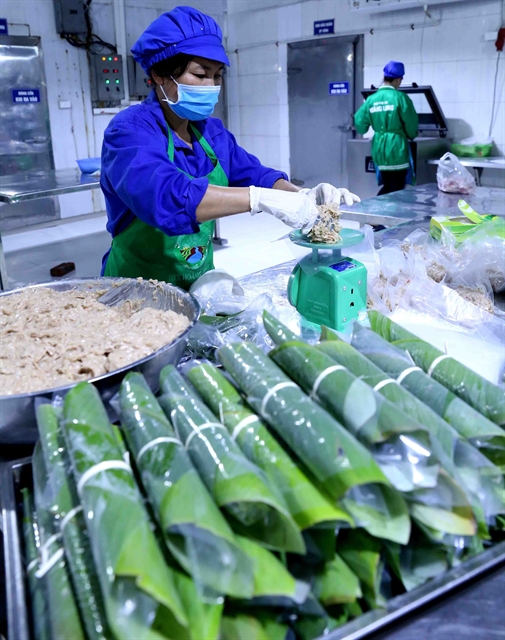With its substantial population and large influx of tourists, Hanoi faces a considerable demand for food, a large proportion of which it needs to bring in. To maintain quality, the city's agricultural sector is diligently managing it through integrated production chains and supply oversight.

The meat chain of Hoàng Long Cooperative in Tri Lễ Hamlet, Tân Ước Commune, Thanh Oai District, Hanoi City. — VNS Photo
With a large population and a high number of visitors, Hà Nội has a significant demand for food.
To ensure quality, Hanoi's agricultural sector is actively controlling it through linked production chains and supply monitoring.
Currently, Hanoi produces only 55 - 60 per cent of its food needs, with the rest supplied by provinces in the north and the Mekong Delta.
To enhance food safety control, Nguyễn Thị Thu Hằng, Head of the Hanoi Sub-Department of Quality, Processing, and Market Development (under the Hanoi Department of Agriculture and Rural Development), said that the city is maintaining and developing 159 linked production-consumption chains for safe agricultural products, including 53 animal chains and 106 plant product chains.
These chains have attracted many businesses, cooperatives and farming households, creating strong brands in the market and for export, such as the Văn Đức safe vegetable chain, the Hoàng Long Cooperative meat chain and the Chương Mỹ grapefruit, Đại Thành longan and Bảo Minh rice chains.
Additionally, Hanoi and 43 other provinces and cities have been actively maintaining and supporting the development of 926 safe food supply chains for the city.
Hằng said: "To ensure the quality of food from agriculture, forestry and fisheries, the Hanoi Sub-Department of Quality, Processing and Market Development has directed units to strengthen inspections, promptly detect and handle violations and create a healthy business environment for establishments to develop, protecting consumer rights."
Hằng noted that building and developing safe agricultural food supply chains plays a particularly important role. These chains help stabilise production, adapt to market demand fluctuations and reduce losses for farmers.
Additionally, developing safe food supply chains supports production units in promoting their product brands to domestic and international consumers, helping distributors select high-quality agricultural products with competitive advantages in the market.
Director of the Vinh Kim Cooperative (Tien Giang) - Hà Nội branch, a unit that supplies a large amount of clean agricultural products to the Hanoi market, Nguyễn Nam Phong, said that, over the past three years, the cooperative has brought specialty agricultural products from Tien Giang province to Hanoi for consumption.
Currently, the cooperative supplies about 50 - 60 tonnes of fruit annually through supermarkets, convenience stores and agricultural processing enterprises. To ensure food safety, the cooperative organises production according to VietGAP standards and all fruit products are labelled for traceability, both domestically and internationally.
Director of the Đoan Ket Agricultural Production and Business Cooperative, Cao Thi Thuy, said that the cooperative has contracts with 2,181 households, ensuring 100 per cent of rice products during harvest. To increase sales, they have partnered with Châu Anh Co., Ltd. to open close to 20 retail rice stores in Hanoi and distribute to agents in nearby provinces.
The cooperative supplies about 3,000 tonnes of paddy and 1,000 tonnes of Japonica rice annually.
Sơn La is one of the northern provinces with safe agricultural product supply chains for the market, including Hanoi. To control food safety, Nguyen Thanh Cong, Vice Chairman of the Sơn La People's Committee, said that the province continues to support cooperatives in building concentrated production areas that apply good agricultural practices, organising certification, assessment and issuing VietGAP or GlobalGAP, or similar standards.
Furthermore, Sơn La also supports cooperatives and enterprises participating in safe agricultural and aquatic product supply chains, purchasing packaging for products to enter the market. It coordinates with Hano's agricultural sector to strengthen the inspection and sampling of products in agricultural supply chains to test food safety indicators according to regulations.
Deputy Director of the Hanoi Department of Agriculture and Rural Development, Nguyen Đinh Hoa, stated that Hanoi will intensify efforts to monitor and sample agricultural products entering and leaving the city, focusing on key groups like vegetables, meat, and seafood.
The city will also support the development of linked production-consumption chains, enhance product value and promote investment in agricultural processing and high-tech farming models. — VNS
Read original article here